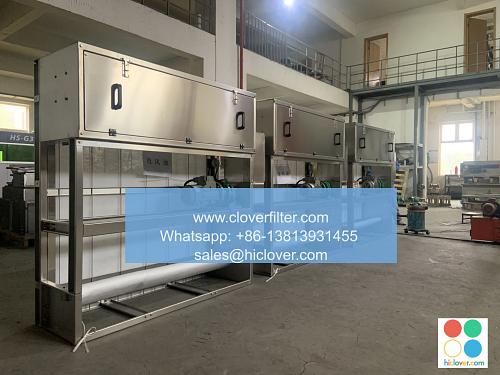The Role of Automatic Roll Air Filters in Preventing Cross-Contamination in Calgary Food Processing

The food processing industry in Calgary is a significant sector that requires strict adherence to cleanliness and safety protocols to prevent cross-contamination. One crucial aspect of maintaining a clean environment is the use of air filtration systems, particularly automatic roll air filters. These filters play a vital role in removing airborne contaminants, such as dust, pollen, and microorganisms, that can compromise the quality and safety of food products.
Automatic roll air filters are designed to capture airborne particles as small as 0.3 microns, including bacteria, viruses, and mold. These filters consist of a roll of filter media that automatically advances as it becomes dirty, ensuring a consistent flow of clean air into the processing area. This continuous replacement of filter media prevents the buildup of contaminants and reduces the risk of cross-contamination.
There are several benefits to using automatic roll air filters in food processing facilities. Firstly, they help to prevent the spread of airborne pathogens, such as Listeria and Salmonella, which can contaminate food products and pose a risk to consumer health. Secondly, these filters reduce the amount of dust and debris in the air, which can settle on food surfaces and equipment, causing contamination. Finally, automatic roll air filters help to maintain a clean environment, reducing the need for frequent cleaning and disinfection, and minimizing the risk of product recalls and reputational damage.
In addition to preventing cross-contamination, automatic roll air filters also contribute to a more efficient and cost-effective food processing operation. By removing airborne contaminants, these filters help to reduce the risk of equipment damage and downtime, as well as the need for costly repairs and replacements. Furthermore, automatic roll air filters can help to extend the shelf life of food products by preventing the growth of mold and bacteria, which can cause spoilage and waste.
To ensure the optimal performance of automatic roll air filters, food processing facilities in Calgary should follow proper maintenance and replacement procedures. This includes regular monitoring of filter performance, replacement of filter media as needed, and cleaning of the filter housing and surrounding areas. Additionally, facilities should ensure that their air filtration systems are designed and installed to meet the specific needs of their operation, taking into account factors such as airflow rates, particle sizes, and humidity levels.
In conclusion, automatic roll air filters are a crucial component of a comprehensive cleanliness and safety protocol in food processing facilities. By removing airborne contaminants and preventing cross-contamination, these filters help to ensure the quality and safety of food products, while also contributing to a more efficient and cost-effective operation.
Conclusion: The use of automatic roll air filters is essential in preventing cross-contamination in Calgary food processing facilities. By understanding the benefits and importance of these filters, food processing facilities can take steps to ensure the quality and safety of their products, while also maintaining a clean and efficient operation.
Frequently Asked Questions (FAQs)
- Q: What is the purpose of automatic roll air filters in food processing facilities?
A: The purpose of automatic roll air filters is to remove airborne contaminants, such as dust, pollen, and microorganisms, that can compromise the quality and safety of food products.
- Q: How do automatic roll air filters prevent cross-contamination?
A: Automatic roll air filters prevent cross-contamination by capturing airborne particles as small as 0.3 microns, including bacteria, viruses, and mold, and preventing them from settling on food surfaces and equipment.
- Q: What are the benefits of using automatic roll air filters in food processing facilities?
A: The benefits of using automatic roll air filters include preventing the spread of airborne pathogens, reducing the amount of dust and debris in the air, maintaining a clean environment, and contributing to a more efficient and cost-effective operation.
- Q: How often should automatic roll air filters be replaced?
A: Automatic roll air filters should be replaced as needed, based on factors such as airflow rates, particle sizes, and humidity levels. Regular monitoring of filter performance is necessary to determine when replacement is required.

